Brownstone Institute
The FDA’s Ties to the Gates Foundation
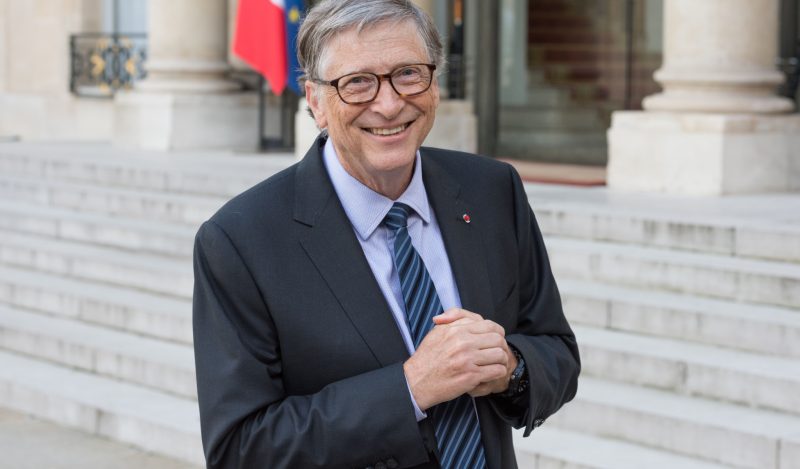
From the Brownstone Institute
BY
In 2017, the US Food and Drug Administration (FDA) entered into a memorandum of understanding (MOU) with the Bill & Melinda Gates Foundation.
Under the MOU, the two entities agreed to share information to “facilitate the development of innovative products, including medical countermeasures,” such as diagnostics, vaccines, and therapeutics to combat disease transmission during a pandemic.
The FDA has MOUs with many academic and non-profit organizations, but few have as much to gain as Bill Gates, who has invested billions into pandemic countermeasures.
Experts are concerned the Gates Foundation could have undue influence over the FDA’s regulatory decisions of these countermeasures.
David Gortler, an ex-senior adviser to the FDA commissioner between 2019 and 2021, says he is “suspicious” of the MOU.
“If the Gates Foundation establishes an MOU with a regulator on a product they want to develop, it seems like it would be a conflict of interest. What if every other drug company did the exact same thing as the Gates Foundation?” he says.
Gortler, now a fellow at the Ethics and Public Policy Center in Washington, DC, explained that normally, meetings between developers and regulators are supposed to be an official part of the public record and subject to Freedom of Information Act requests.
“However, an MOU such as this can circumvent the usual requirements for the transparency of official communications,” says Gortler. “This way their communications can be kept secret.”
David Bell, a former medical officer for the World Health Organization (WHO) who now works as a public health physician and biotech consultant, agrees that the MOU has potential to corrupt the regulatory process.
“The narrative is that philanthropic foundations can only be good, because they’re making vaccines and saving thousands of lives, so we need to cut the red tape and help the FDA get stuff done quickly otherwise children will die,” says Bell. “But in reality, it has potential to corrupt the whole system.”
Bell adds, “Speaking generally, close relationships between regulators and developers raise inevitable risks that shortcuts and favours will breakdown the rigorousness of the product review, putting the public at risk.”
Revolving door
The FDA has been roundly criticised for its “revolving door.” Ten of the past 11 FDA commissioners left the agency and secured roles with pharmaceutical companies they once regulated.
Similarly, the Gates Foundation hired high-ranking members of the FDA, who bring with them intimate knowledge of the regulatory process.
For example, Murray Lumpkin had a 24-year career at the FDA, serving as senior advisor to the FDA commissioner and representative for global issues. Now, he is deputy director of regulatory affairs at the Gates Foundation, and signatory on the MOU.
And Margaret Hamburg, who served as FDA commissioner between 2009 and 2015, is now on the Scientific Advisory Board of the Gates Foundation.

Bell has no doubt that these appointments were strategic to “game the system” saying, “If I worked at the Gates Foundation, I would certainly hire somebody like Murray Lumpkin.”
The only way to fix the revolving door problem Bell says, is to have a ‘non-compete clause’ in their contracts.
“It might be that FDA employees cannot work for the people they’ve regulated for at least 10 years. There are places that have those rules – private companies have agreements that you can’t work for a rival,” said Bell.
The FDA dismissed questions about the potential for conflicts of interest, or the lack of transparency over its communications with the Gates Foundation. In a statement, the FDA said:
FDA regulatory decision making is science-based. Former FDA officials do not impact regulatory decisions. FDA only collaborates with the Bill and Melinda Gates Foundation under the MOU as described.
Gates has billions at stake
Gates boasted about receiving a 20-to-1 return on his $10 billion investment into the “financing and delivery” of medicines and vaccines.
“It’s the best investment I’ve ever made,” he wrote in the Wall Street Journal. “Decades ago, these investments weren’t sure bets, but today, they almost always pay off in a big way.”
In Sept 2019, just prior to the pandemic, SEC filings showed the foundation purchased over 1 million shares in BioNTech (Pfizer’s partner) for $18.10/share. By Nov 2021, the foundation dumped most of the stock for an average of $300/share.
Investigative journalist Jordan Schachtel reported the foundation pocketed approximately $260 million in profit – more than 15 times its original investment – most of it untaxed because it was invested through the foundation.
In his recent book, How to Prevent the Next Pandemic, Gates warns that future pandemics are the biggest threat to humankind and that survival depends on global pandemic preparedness strategies, firmly positioning himself at the center of shaping the agenda.
In October 2019, the Gates Foundation and the World Economic Forum hosted Event 201, which gathered government agencies, social media companies, and national security organizations to war game a “fictional” global pandemic.

The key recommendations from the event were that such a crisis would require the deployment of new vaccines, surveillance, and control of information and human behaviours, by orchestrating the cooperation and coordination of key industries, national governments, and international institutions.
Several weeks later when the covid-19 pandemic emerged, many aspects of this ‘hypothetical scenario’ became a chilling reality.
The Gates Foundation, which holds shares in a range of drug companies including Merck, Pfizer, and Johnson & Johnson, is now credited with wielding significant influence over the direction of the global response to the pandemic, saying its goal is to “vaccinate the entire world” with a covid-19 vaccine.
Global dominance
The Gates Foundation has poured millions into funding NGOs, media, and international agencies, earning Gates significant political clout.
Financial contributions to the media have garnered Gates favourable news coverage, boasting on the foundation’s website it committed almost $3.5 million to the Guardian in 2020 – 2023.
The UK medicines regulator – the MHRA – disclosed it took approximately $3 million in funding from the Gates Foundation in 2022, which would span across several financial years.
Presidential candidate Robert F Kennedy, Jr labelled Gates “the most powerful man in public health” because he managed to steer the WHO’s pandemic strategy to focus primarily on vaccination.
Kennedy said in an interview that the WHO “begs and rolls over” for Gates’ funding, which now makes up over 88 percent of the total amount of the WHO’s donations by philanthropic foundations.
“I think [Gates] believes that he is somehow ordained divinely to bring salvation to the world through technology,” said Kennedy. “He believes the only path to good health is inside a syringe.”
The Gates Foundation’s CEO Mark Suzman responded to concerns that the foundation has “disproportionate sway in setting national and global agendas, without any formal accountability to voters or international bodies.”
“It’s true that between our dollars, voice, and convening power, we have access and influence that many others do not,” admitted Suzman in his 2023 annual letter .
“But make no mistake – where there’s a solution that can improve livelihoods and save lives, we’ll advocate persistently for it. We won’t stop using our influence, along with our monetary commitments, to find solutions,” he wrote.
Republished from the author’s Substack
Brownstone Institute
Trump Covets the Nobel Peace Prize
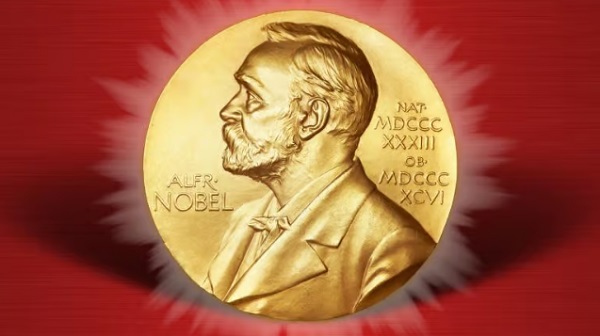
From the Brownstone Institute
By
Many news outlets reported the announcement of the Nobel Peace Prize on Friday by saying President Donald Trump had missed out (Washington Post, Yahoo, Hindustan Times, Huffington Post), not won (USA Today), fallen short (AP News), lost (Time), etc. There is even a meme doing the rounds about ‘Trump Wine.’ ‘Made from sour grapes,’ the label explains, ‘This is a full bodied and bitter vintage guaranteed to leave a nasty taste in your mouth for years.’

For the record, the prize was awarded to María Corina Machado for her courageous and sustained opposition to Venezuela’s ruling regime. Trump called to congratulate her. Given his own attacks on the Venezuelan president, his anger will be partly mollified, and he could even back her with practical support. He nonetheless attacked the prize committee, and the White House assailed it for putting politics before peace.
He could be in serious contention next year. If his Gaza peace plan is implemented and holds until next October, he should get it. That he is unlikely to do so is more a reflection on the award and less on Trump.
So He Won the Nobel Peace Prize. Meh!
Alfred Nobel’s will stipulates the prize should be awarded to the person who has contributed the most to promote ‘fraternity between nations…abolition or reduction of standing armies and…holding and promotion of peace congresses.’ Over the decades, this has expanded progressively to embrace human rights, political dissent, environmentalism, race, gender, and other social justice causes.
On these grounds, I would have thought the Covid resistance should have been a winner. The emphasis has shifted from outcomes and actual work to advocacy. In honouring President Barack Obama in 2009, the Nobel committee embarrassed itself, patronised him, and demeaned the prize. His biggest accomplishment was the choice of his predecessor as president: the prize was a one-finger send-off to President George W. Bush.
There have been other strange laureates, including those prone to wage war (Henry Kissinger, 1973), tainted through association with terrorism (Yasser Arafat, 1994), and contributions to fields beyond peace, such as planting millions of trees. Some laureates were subsequently discovered to have embellished their record, and others proved to be flawed champions of human rights who had won them the treasured accolade.
Conversely, Mahatma Gandhi did not get the prize, not for his contributions to the theory and practice of non-violence, nor for his role in toppling the British Raj as the curtain raiser to worldwide decolonisation. The sad reality is how little practical difference the prize has made to the causes it espoused. They bring baubles and honour to the laureates, but the prize has lost much of its lustre as far as results go.
Trump Was Not a Serious Contender
The nomination processes start in September and nominations close on 31 January. The five-member Norwegian Nobel committee scrutinises the list of candidates and whittles it down between February and October. The prize is announced on or close to 10 October, the date Alfred Nobel died, and the award ceremony is held in Oslo in early December.
The calendar rules out a newly elected president in his first year, with the risible exception of Obama. The period under review was 2024. Trump’s claims to have ended seven wars and boasts of ‘nobody’s ever done that’ are not taken seriously beyond the narrow circle of fervent devotees, sycophantic courtiers, and supplicant foreign leaders eager to ingratiate themselves with over-the-top flattery.
Trump Could Be in Serious Contention Next Year
Trump’s 20-point Gaza peace plan falls into three conceptual-cum-chronological parts: today, tomorrow, and the day after. At the time of writing, in a hinge moment in the two-year war, Israel has implemented a ceasefire in Gaza, Hamas has agreed to release Israeli hostages on 13-14 October, and Israel will release around 2,000 Palestinian prisoners (today’s agenda). So why are the ‘Ceasefire Now!’ mobs not out on the streets celebrating joyously instead of looking morose and discombobulated? Perhaps they’ve been robbed of the meaning of life?
The second part (tomorrow) requires Hamas demilitarisation, surrender, amnesty, no role in Gaza’s future governance, resumption of aid deliveries, Israeli military pullbacks, a temporary international stabilisation force, and a technocratic transitional administration. The third part, the agenda for the day after, calls for the deradicalisation of Gaza, its reconstruction and development, an international Peace Board to oversee implementation of the plan, governance reforms of the Palestinian Authority, and, over the horizon, Palestinian statehood.
There are too many potential pitfalls to rest easy on the prospects for success. Will Hamas commit military and political suicide? How can the call for democracy in Gaza and the West Bank be reconciled with Hamas as the most popular group among Palestinians? Can Israel’s fractious governing coalition survive?
Both Hamas and Israel have a long record of agreeing to demands under pressure but sabotaging their implementation at points of vulnerability. The broad Arab support could weaken as difficulties arise. The presence of the internationally toxic Tony Blair on the Peace Board could derail the project. Hamas has reportedly called on all factions to reject Blair’s involvement. Hamas official Basem Naim, while thanking Trump for his positive role in the peace deal, explained that ‘Palestinians, Arabs and Muslims and maybe a lot [of] people around the world still remember his [Blair’s] role in causing the killing of thousands or millions of innocent civilians in Afghanistan and Iraq.’
It would be a stupendous achievement for all the complicated moving parts to come together in stable equilibrium. What cannot and should not be denied is the breathtaking diplomatic coup already achieved. Only Trump could have pulled this off.
The very traits that are so offputting in one context helped him to get here: narcissism; bullying and impatience; bull in a china shop style of diplomacy; indifference to what others think; dislike of wars and love of real estate development; bottomless faith in his own vision, negotiating skills, and ability to read others; personal relationships with key players in the region; and credibility as both the ultimate guarantor of Israel’s security and preparedness to use force if obstructed. Israelis trust him; Hamas and Iran fear him.
The combined Israeli-US attacks to degrade Iran’s nuclear capability underlined the credibility of threats of force against recalcitrant opponents. Unilateral Israeli strikes on Hamas leaders in Qatar highlighted to uninvolved Arabs the very real dangers of continued escalation amidst the grim Israeli determination to rid themselves of Hamas once and for all.
Trump Is Likely to Be Overlooked
Russia has sometimes been the object of the Nobel Peace Prize. The mischievous President Vladimir Putin has suggested Trump may be too good for the prize. Trump’s disdain for and hostility to international institutions and assaults on the pillars of the liberal international order would have rubbed Norwegians, among the world’s strongest supporters of rules-based international governance, net zero, and foreign aid, the wrong way.
Brash and public lobbying for the prize, like calling the Norwegian prime minister, is counterproductive. The committee is fiercely independent. Nominees are advised against making the nomination public, let alone orchestrating an advocacy campaign. Yet, one laureate is believed to have mobilised his entire government for quiet lobbying behind the scenes, and another to have bad-mouthed a leading rival to friendly journalists.
Most crucially, given that Scandinavian character traits tip towards the opposite end of the scale, it’s hard to see the committee overlooking Trump’s loud flaws, vanity, braggadocio, and lack of grace and humility. Trump supporters discount his character traits and take his policies and results seriously. Haters cannot get over the flaws to seriously evaluate policies and outcomes. No prizes for guessing which group the Nobel committee is likely to belong to. As is currently fashionable to say when cancelling someone, Trump’s values do not align with those of the committee and the ideals of the prize.
Autism
Trump Blows Open Autism Debate
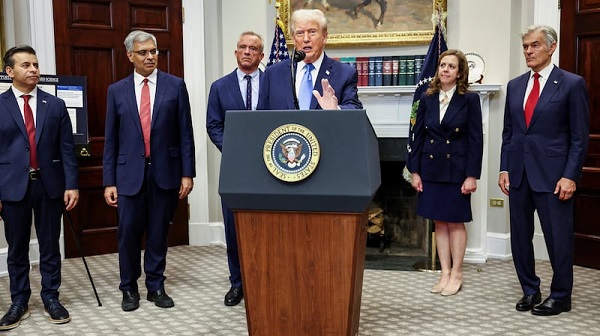
From the Brownstone Institute
By
Trump made sweeping claims that would have ended political careers in any other era. His health officials tried to narrow the edges, but the President ensured that the headlines would be his.
Autism has long been the untouchable subject in American politics. For decades, federal agencies tiptoed around it, steering research toward genetics while carefully avoiding controversial environmental or pharmaceutical questions.
That ended at the White House this week, when President Donald Trump tore through the taboo with a blunt and sometimes incendiary performance that left even his own health chiefs scrambling to keep pace.
Flanked by Health Secretary Robert F. Kennedy, Jr., NIH Director Jay Bhattacharya, FDA Commissioner Marty Makary, CMS Adminstrator Dr Mehmet Oz, and other senior officials, Trump declared autism a “horrible, horrible crisis” and recounted its rise in startling terms.
“Just a few decades ago, one in 10,000 children had autism…now it’s one in 31, but in some areas, it’s much worse than that, if you can believe it, one in 31 and…for boys, it’s one in 12 in California,” Trump said.
The President insisted the trend was “artificially induced,” adding: “You don’t go from one in 20,000 to one in 10,000 and then you go to 12, you know, there’s something artificial. They’re taking something.”
Trump’s Blunt Tylenol Warning
The headline moment came when Trump zeroed in on acetaminophen, the common painkiller sold as Tylenol — known as paracetamol in Australia.
While Kennedy and Makary described a cautious process of label changes and physician advisories, Trump dispensed with nuance.
“Don’t take Tylenol,” Trump said flatly. “Don’t take it unless it’s absolutely necessary…fight like hell not to take it.”
Kennedy laid out the evidence base, citing “clinical and laboratory studies that suggest a potential association between acetaminophen used during pregnancy and adverse neurodevelopmental outcomes, including later diagnosis for ADHD and autism.”
Makary reinforced the point with references to the Boston Birth Cohort, the Nurses’ Health Study, and a recent Harvard review, before adding: “To quote the dean of the Harvard School of Public Health, there is a causal relationship between prenatal acetaminophen use and neurodevelopmental disorders of ADHD and autism spectrum disorder. We cannot wait any longer.”
But where the officials spoke of “lowest effective dose” and “shortest possible duration,” Trump thundered over the top: “I just want to say it like it is, don’t take Tylenol. Don’t take it if you just can’t. I mean, it says, fight like hell not to take it.”
Vaccines Back on Center Stage
The President then pivoted to vaccines, reviving arguments that the medical establishment has long sought to bury. He blasted the practice of giving infants multiple injections at a single visit.
“They pump so much stuff into those beautiful little babies, it’s a disgrace…you get a vat of 80 different vaccines, I guess, 80 different blends, and they pump it in,” Trump said.
His solution was simple: “Go to the doctor four times instead of once, or five times instead of once…it can only help.”
On the measles, mumps, and rubella shot, Trump insisted: “The MMR, I think should be taken separately…when you mix them, there could be a problem. So there’s no downside in taking them separately.”
The moment was astonishing — echoing arguments that had once seen doctors like Andrew Wakefield excommunicated from medical circles.
It was the kind of line of questioning the establishment had spent decades trying to banish from mainstream debate.
Hep B Vaccine under Attack
Trump dismissed the rationale for giving the hepatitis B vaccine at birth.
“Hepatitis B is sexually transmitted. There’s no reason to give a baby that’s just born hepatitis B [vaccine]. So I would say, wait till the baby is 12 years old,” he said.
He made clear that he was “not a doctor,” stressing that he was simply offering his personal opinion. But the move could also be interpreted as Trump choosing to take the heat himself, to shield Kennedy’s HHS from what was sure to be an onslaught of criticism.
The timing was remarkable.
Only last week, the CDC’s Advisory Committee on Immunisation Practices (ACIP) had been preparing to vote on whether to delay the hepatitis B shot until “one month” of age — a modest proposal that mainstream outlets derided as “anti-vax extremism.”
By contrast, Trump told the nation to push the jab back 12 years. His sweeping denunciations made the supposedly radical ACIP vote look almost tame.
The irony was inescapable — the same media voices who had painted Kennedy’s reshaped ACIP as reckless now faced a President willing to say far more than the panel itself dared.
A New Treatment and Big Research Push
The administration also unveiled what it deemed a breakthrough: FDA recognition of prescription leucovorin, a folate-based therapy, as a treatment for some autistic children.
Makary explained: “It may also be due to an autoimmune reaction to a folate receptor on the brain not allowing that important vitamin to get into the brain cells…one study found that with kids with autism and chronic folate deficiency, two-thirds of kids with autism symptoms had improvement and some marked improvement.”
Dr Oz confirmed Medicaid and CHIP (the Children’s Health Insurance Program, which provides low-cost health coverage to children in families that earn too much to qualify for Medicaid) would cover the treatment.
“Over half of American children are covered by Medicaid and CHIP…upon this label change…state Medicaid programs will cover prescription leucovorin around the country, it’s yours,” said Oz.
Bhattacharya announced $50 million in new NIH grants under the “Autism Data Science Initiative.”
He explained that 13 projects would be funded using “exposomics” — the study of how environmental exposures like diet, chemicals, and infections interact with our biology — alongside advanced causal inference methods.
“For too long, it’s been taboo to ask some questions for fear the scientific work might reveal a politically incorrect answer,” Bhattacharya said. “Because of this restricted focus in scientific investigations, the answers for families have been similarly restricted.”
Mothers’ Voices
The press conference also featured raw testimony from parents.
Amanda, mother of a profoundly autistic five-year-old, told Trump: “Unless you’ve lived with profound autism, you have no idea…it’s a very hopeless feeling. It’s very isolating. Being a parent with a profound autistic child, even just taking them over to your friend’s house is something we just don’t do.”
Jackie, mother of 11-year-old Eddie, said: “I’ve been praying for this day for nine years, and I’m so thankful to God for bringing the administration into our lives…I never thought we would have an administration that was courageous enough to look into things that no prior administration had.”
Their stories underscored what Kennedy said at the announcement about “believing women.” Here were mothers speaking directly about their lived reality, demanding that uncomfortable conversations could no longer be avoided.
Clashes with the Press Corps
Reporters pressed Trump on the backlash from medical groups.
Asked about the American College of Obstetricians and Gynecologists (ACOG) declaring acetaminophen safe in pregnancy, Trump shot back, “That’s the establishment. They’re funded by lots of different groups. And you know what? Maybe they’re right. I don’t think they are, because I don’t think the facts bear it out at all.”
When one journalist raised the argument that rising diagnoses reflected better recognition, Kennedy bristled,
“That’s one of the canards that has been promoted by the industry for many years,” he said. “It’s just common sense, because you’re only seeing this in people who are under 50 years of age. If it were better recognition or diagnosis, you’d see it in the seventy-year-old men. I’ve never seen this happening in people my age.”
Another reporter then asked Trump, “Should the establishment media show at least some openness to trying to figure out what the causes are?”
“I wish they would. Yeah, why are they so close-minded?” Trump replied. “It’s not only the media, in all fairness, it’s some people, when you talk about vaccines, it’s crazy…I don’t care about being attacked.”
Breaking the Spell
For years, autism policy has been shaped by caution, consensus, and deference to orthodox positions. That spell was broken at today’s press conference.
The dynamic was striking. Kennedy, Makary, Bhattacharya, and Oz leaned on scientific papers, review processes, and cautious advisories. Trump, by contrast, brushed it all aside, hammering his message home through repetition and personal anecdotes.
Trump made sweeping claims that would have ended political careers in any other era. His health officials tried to narrow the edges, but the President ensured that the headlines would be his.
“This will be as important as any single thing I’ve done,” Trump declared. “We’re going to save a lot of children from a tough life, really tough life. We’re going to save a lot of parents from a tough life.”
Whatever the science ultimately shows, the politics of autism in America will never be the same.
Republished from the author’s Substack
-
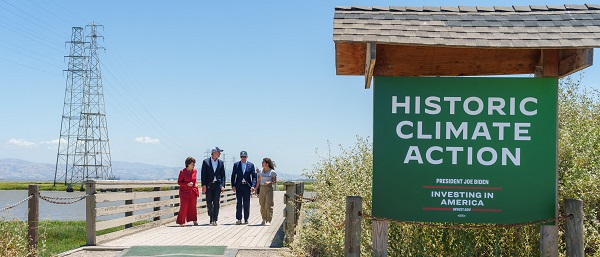
 Daily Caller2 days ago
Daily Caller2 days agoUtah Republican Senator Planning To Attend Big Globalist Climate Shindig Despite Trump’s Energy Policies
-

 International23 hours ago
International23 hours agoNumber of young people identifying as ‘transgender’ declines sharply: report
-

 Energy1 day ago
Energy1 day agoIndigenous Communities Support Pipelines, Why No One Talks About That
-
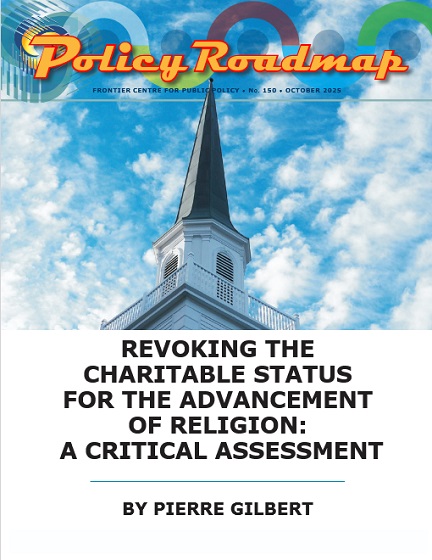
 Business1 day ago
Business1 day agoFinance Committee Recommendation To Revoke Charitable Status For Religion Short Sighted And Destructive
-

 Business19 hours ago
Business19 hours ago“Nation Building,” Liberal Style: We’re Fixing a Sewer, You’re Welcome, Canada
-

 Bruce Dowbiggin19 hours ago
Bruce Dowbiggin19 hours agoLong-Distance Field Goals Have Flipped The Field. Will The NFL Panic?
-

 Business2 days ago
Business2 days agoFinance Titans May Have Found Trojan Horse For ‘Climate Mandates’
-
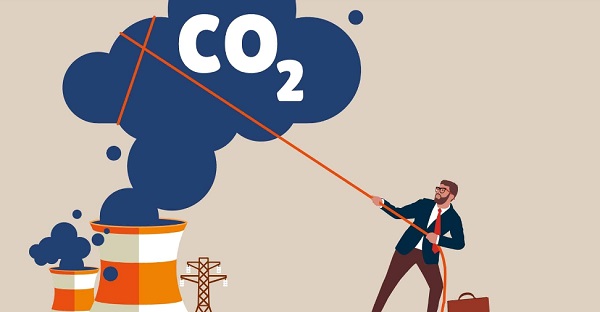
 Alberta21 hours ago
Alberta21 hours agoThe Technical Pitfalls and Political Perils of “Decarbonized” Oil






